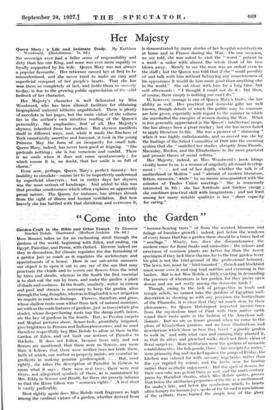Her Majesty
Queen Mary : a Life and Intimate Study. By Kathleen
Woodward. (Hutchinson. 7s. 6d.) No sovereign ever had a fuller sense of responsibility and duty than has our King, and none was ever more capably or loyally supported by his wife. Queen Mary was not always a popular favourite. Her reticence caused her at first to be misunderstood, and she never tried to make an easy and superficial conquest of her people's hearts. That she has WW1 them so completely at last, and holds them so securely to-day, is due to the growing public appreciation of the solid bedrock of her character.
Her Majesty's character is well delineated by Miss Woodward, who has been allowed facilities for obtaining biographical material hitherto unpublished. There is plenty of anecdote in her pages, but the main virtue of the volume lies in the author's own intuitive reading of the Queen's personality. She emphasizes, first of all, Her Majesty's shyness, inherited from her mother. But shyness manifests itself in different ways, and, while it made the Duchess of Teck unnaturally assertive and buoyant, it took in the young Princess May the form of an incapacity for small talk: Queen Mary; indeed, has never been good at feigning. " She pretends nothing ; she is too veracious and candid. There is no Smile when it does not come spontaneously ; for which reason it is, no doubt, that her smile is so full of charm."
Even now, perhaps, Queen Mary's perfect honesty—her inability to simulate—Leauses her to be imperfectly understood by superficial observers ; but in earlier days her shyness was the most serious of handicaps. And added to this was that peculiar sensitiveness which often explains an apparently mud nature. The. Queen, for instance, has always shrunk from, the sight of illness and human mutilation. But how bravely she has battled with that shrinking, and overcome it; is demonstrated by many stories of her hospital ministrations at home and in France during the War. On one occasion, we are told, she was asked to visit the " worst " patient in a ward—a sailor with almost the whole front of his face blown away. Merely to see the man was an ordeal even to the staff ; but the Queen was told that if she " could possibly sit and talk with him without betraying any consciousness of his appearance it would do him more good than anything else in the world." She sat alone with him for a long time, but said afterwards : " I thought I could not do it ; but then,. of bourse, there simply is nothing one can't do."
If, however, courage is one of Queen Mary's traits, she has ability as well. Her practical and domestic gifts are well known, though details of which the public may be unaware are here given, especially with regard to the manner in which she marshalled the energies of women during the War. What is less generally appreciated is the Queen's intellectual range. She has always been a great reader ; but she has never failed to applyliterature to life. She was a pioneer of " slumming " when it was highly unfashionable, and so moved was she by the findings of the Select Committee of 1888 into the sweating system that she " snatched her studies abruptly from Fronde, Macaulay, Ruskin, and the Elizabethans to the more practical and prosaic theses of social reform."
Her Majesty; indeed, as Miss Woodward's book brings vividly home to us, is a woman of singularly all-round develop- ment : " . not out- of her depth, whether the talk is of motherhood or Moliere " and " abreast of modern literature, fiction, memoirs,", while " by no means unacquainted with the minutes of Trades Union meetings." She is immensely interested in life ; she -has fortitude and tireless energy ; she combines practical skill with imagination ; and not-least among her many notable qualities is her " sheer capacity for caring."










































 Previous page
Previous page